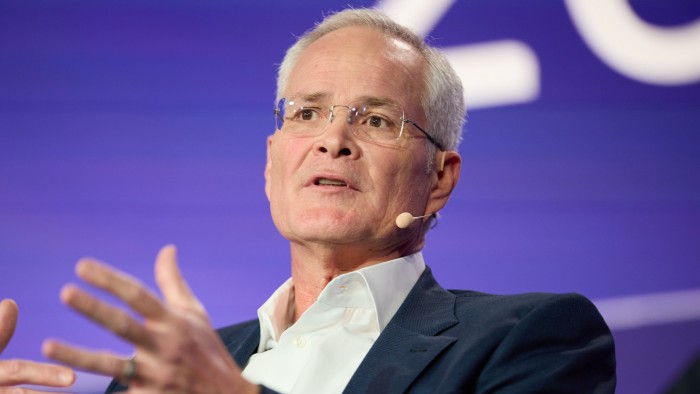Stay informed with free updates
Simply sign up to the EU business regulation myFT Digest — delivered directly to your inbox.
ExxonMobil says the Trump administration should use trade talks with Brussels to fight tough new EU climate and human rights regulations that threaten US companies with “bone-crushing penalties”.
Darren Woods, Exxon’s chief executive, said the EU’s Corporate Sustainability Due Diligence Directive threatened to entangle US companies in bureaucracy, erode their global competitiveness and ran counter to President Donald Trump’s deregulation agenda.
Exxon has consistently lobbied against the regulation, due to be phased in from 2027, which will require EU and non-EU companies with significant turnover in the bloc to ensure that their supply chains do not harm the environment or human rights. EU member states will be allowed to impose fines of up to 5 per cent of global turnover on companies found to be in breach of the law.
“This is counter, frankly, to everything the Trump administration has been trying to do on the regulation front . . . As the US administration eases US regulatory burdens on companies here in the US, it is being replaced by EU climate regulations,” Woods told reporters on a conference call as the company published its quarterly results.
“It is going to tangle them up in more bureaucratic red tape in Europe . . . and subject [companies] to bone-crushing penalties, so that’s a big issue that is yet to be addressed, and hopefully will as part of these [trade] negotiations.”
On Sunday, Trump and European Commission president Ursula von der Leyen announced the outlines of an EU-US trade deal. This included a 15 per cent tariff on most EU exports to the US and a commitment by European companies to buy $750bn of energy exports.
But talks are expected to continue between the two sides, with French President Emmanuel Macron saying this week the agreement was the first step in “a negotiation process”.
US business groups say the EU directive is unfair because it has significant extraterritorial reach, affecting non-EU companies that meet specific turnover or other criteria within the bloc’s market. They argue that compliance and reporting requirements will dent their global competitiveness.
But the directive has also prompted a pushback from businesses and some politicians in Europe, including Macron and German Chancellor Friedrich Merz, who warn it will undermine European competitiveness.
The commission has proposed a simplification of the law that is now being negotiated by EU member states and the European parliament. It could raise the threshold so that only the very largest companies would have to comply.
Environmental campaigners have said that the effort to untie some of the EU’s ambitious green regulations has been a victory for the oil and gas industry.
More than 180 investors, financial institutions and companies, including Ikea, EDF and Nokia, have signed a statement calling for Brussels to preserve the rules. The due diligence directive and green reporting rules “are essential for achieving the EU’s wider sustainability, growth and competitiveness ambitions”, the statement said.
Trump has already used trade talks with international partners to advance the interests of the US oil and gas industry, including by asking the EU, Japan and South Korea to buy more of the country’s energy products. US officials have shown a willingness to fight climate laws and regulations at home and abroad, including by pulling out of the Paris Agreement.
EU rules on environmental and climate regulations, such as laws governing deforestation and methane, were among those raised in talks ahead of Sunday’s deal, officials said.
Woods said the Trump administration’s recent reversal of US climate rules was likely to swing back under a new administration or Congress due to the politicisation of the issue. He said Exxon would continue to work towards cutting greenhouse gas emissions from its operations to minimise its impact on the environment. This does not include the emissions arising from the burning of the oil and gas products that it sells.
“As administrations change or Congress changes, you’re going to see the emphasis shift back and forth . . . We’re well ahead of our plans for reducing emissions, reducing flaring. That doesn’t change with the political party in office.”
Exxon is being sued by multiple US states. They allege the oil major misled the public about climate change and the dangers of fossil fuels. The company denies the allegations.
Exxon and Chevron, the two largest US oil companies, both reported falls in second-quarter profits on Friday, as lower oil prices took a toll on their operations.
Climate Capital

Where climate change meets business, markets and politics. Explore the FT’s coverage here.
Are you curious about the FT’s environmental sustainability commitments? Find out more about our science-based targets here
